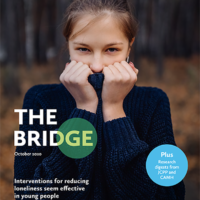Neurocognitive
-

More frequent naps are associated with lower cognitive development in a cohort of 8–38-month-old children, during the Covid-19 pandemic
Open Access paper from JCPP Advances – ‘Here we investigate sleep patterns in association with two measures of cognitive ability, vocabulary size, measured with the Oxford-Communicative Development Inventory and cognitive executive functions (EF), measured with the Early EF Questionnaire, in a cohort of 8–38-month-olds’. Teodora Gliga (pic) et al.
Read more -

Childhood mental health difficulties mediate the long-term association between early-life adversity at age 3 and poorer cognitive functioning at ages 11 and 14
Open Access paper from the JCPP – ‘Here, we test the hypothesis that early-life adversity may lead to mental health challenges which in turn have adverse consequences for the development of cognitive abilities.’ Tochukwu Nweze (pic) et al.
Read more -

Annual Research Review: Perspectives on progress in ADHD science – from characterization to cause
Open Access paper from the JCPP – “In this review, we provide a selective and focused survey of the scientific field of ADHD, providing our personal perspectives on what constitutes the scientific consensus, important new leads to be highlighted, and the key outstanding questions to be addressed going forward. We cover two broad domains – clinical characterization and, risk factors, causal processes and neuro-biological pathways”. Edmund J.S. Sonuga-Barke (pic) et al.
Read more -

Latent class analysis to characterize neonatal risk for neurodevelopmental differences
Open Access paper from the JCPP – “Neonatal risk factors, such as preterm birth and low birth weight, have been robustly linked to neurodevelopmental deficits, yet it is still unclear why some infants born preterm and/or low birth weight experience neurodevelopmental difficulties while others do not”. Allison M. Momany (pic) et al.
Read more -

The Centre for Attention Learning and Memory (CALM) Approach to Neurodevelopmental Research – MRC Cognition and Brain Sciences Unit University Of Cambridge
Our thinking around neurodevelopmental disorders is undergoing a period of rapid change. The traditional approach, endorsed by classification systems such as the Diagnostic Statistical Manual, defines neurodevelopmental disorders such as autism and attention-deficit hyperactivity disorder (ADHD) as distinct categories.
Read more -

Is frontoamygdalar connectivity in the resting brain linked with externalising behaviours during development?
Externalising problems tend to vary over the course of development, but often peak in late adolescence. Data suggest that the frontoamygdalar brain circuitry (involved in emotion regulation) might have an important role in mediating externalising behaviour.
Read more -

EEG data might help identify children at risk for social anxiety
Electroencephalography (EEG) is a non-invasive method to monitor the electrical activity of the brain. There are five main broad frequency bands in the EEG power spectrum: alpha, beta, gamma, delta and theta. Data suggest that EEG-derived delta–beta coupling — indicating related activity in the delta and beta frequency bands — might serve as a marker of emotion regulation.
Read more -

Dr. Eric Fombonne
Dr. Eric Fombonne trained in child and adolescent psychiatry in France. He held appointments as clinical scientist at the National Institute of Health and Medical Research (INSERM, France), as Senior Lecturer and Reader at the Institute of Psychiatry and Maudsley Hospital, King’s College London, UK (1993-2001), as tenured Professor of Psychiatry at McGill University (Canada), Head of the Division of Child Psychiatry and Canada Research Chair in Child Psychiatry (2001-2012).
Read more -

Does late-onset ADHD share the same neurocognitive markers as childhood-onset ADHD?
Researchers in the Netherlands have published their findings from a 6-year prospective, longitudinal study that aimed to identify neurocognitive markers of late-onset attention-deficit/hyperactivity disorder (ADHD).
Read more -

October 2020 – The Bridge
Welcome to the October 2020 issue of The Bridge. Here in the UK, October is Black History Month, a time for celebration of the achievements and contributions of Black people to British society, as well as continued learning about Black history.
Read more